Since moving to Thompson in the summer, Russell Peters has begun providing a new and unique service to Thompsonites - music therapy.
"Sometimes people think 'music therapy, well I put an iPod on all the time,' and that's wonderful - but music therapy is based more on the interactive approach," explains Peters, who admits that it's difficult for him to describe exactly what he does. "It's an alternative way of promoting health. It's particularly useful for three main populations - geriatrics, particularly Alzheimer's and related dementias, children with autism, and adults and children with mental retardation or developmental disabilities."
Tonal Connections Music Therapy is the name of Peters' business, and Peters says that while some clients are referred to him by doctors or therapists, it's not a necessity - anybody can phone him up to say that they, or somebody they know, is interested in learning more about music therapy and what he has to offer.
"I look at ways that I can involve that person, to the best of their ability, in the music-making process," he says. "There's a lot of improvisation, a lot of spontaneous composition. I'll do a lot of singing of familiar songs - and again, that depends on the person. If it's a child, I'll do some music from the standard child's repertoire. With older people, I find country is very popular - Johnny Cash and Willie Nelson. The old songs from the war era are wildly popular with people who have Alzheimer's, because they're at a certain age where they've become hardwired in their brain. Even people that are severely impaired - they might not be able to speak anymore, they might not be able to have a conversation, but they can sing all the words."
Peters earned a bachelor's degree in psychology from the University of Winnipeg, but then began to question whether his field of study was something he wanted to make a career out of. "I'd always been into music," he notes. "When I was younger, I played piano for years. When I got back into it, I thought 'maybe I want to do something professionally with music."
That's when Peters learned of the music therapy degree program available at Canadian Mennonite University in Winnipeg. "I got lucky, I happened to be in the right place at the right time," he notes. "Music therapy was brand new, they'd only had it for a couple of years. The Mennonite community is very well known for how it embraces music in its spirituality."
Not long after graduating, Peters' wife began working for the Burntwood Regional Health Authority as a medical lab technologist, and Peters - who is also offering piano lessons with plans to add guitar - saw the opportunity to put his new degree into practice.
Peters doesn't believe that Thompson - or anywhere else in Northern Manitoba for that matter - has ever had a music therapist. He is a member of the Music Therapy Association of Manitoba, which has a roster of approximately 25 therapists. "It's a very, very small community," he says. "It's active mostly in Winnipeg."
There is no set format or textbook structure as to how music therapy works, says Peters. He finds himself tailoring each session to the needs and responses of the client - what problems they are having as well as what they are capable of musically. "It's very much based on an interactive approach," he explains. "I've got a big bag of percussion instruments, basic instruments that anybody can play."
"There isn't a textbook goal," says Peters. "During the assessment, I'll figure out what exactly it is we're trying to achieve with this person. For some people, it might be a matter of having them become more communicative or more open socially, particularly if they're working in a group situation. It generally relates to issues of motivation, communication, self-expression. Mainly the goals are going to be psychological in nature, but they can be physical - increasing range of motion, for example."
"If you look at any therapy, there's going to be two very important components - there's the tool, and the relationship," he notes. "In the case of music therapy, music is the tool that we use to form and to nurture a therapeutic relationship, which we hope will motivate the client we're working with towards a positive change."




